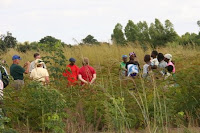






Friday May 8th, 2009
Today we had the best food of our two weeks here in Malawi. The story of how that came to be is the result of an incredible project. It is the miracle of developing independence for vulnerable villages in 4 regions of Malawi. We visited one of those villages in Machinga Region.
At the end of a long dusty road lies a typical Malawian village. Until 3 years ago, the village, like most others was dependent on the annual maize crop which, in turn, is dependent on significant annual rainfall. At the start of this disaster mitigation project Malawi had suffered 3 years of drought which brought hardship and starvation to the entire country.
In Machinga, Emmanuel International, in partnership with other local NGO’s, began a program of Disaster Risks Reduction. The community learned to grow some drought resistant crops such as, sweet potato, cassava, and beans. Very slowly the people are learning to change their diets to include some of these other foods. Still, it’s true that Malawians feel they haven’t eaten a proper meal unless it includes maize. But change is coming slowly and another drought will not have the devastating effects as it has in the past.
In addition, they began a program of reforestation to provide fuel for cooking. As wood is the only source of fuel for most Malawians, it has been important to develop methods of cooking to use less wood. This they have done with the use of a clay stove. The villagers make these stoves by collecting clay, forming the shapes and firing them in their homemade kiln. This is a fabulous income generating activity.
The people are proud of their progress and able to place a wider variety of nutritious food on their table. They also have developing a unique "slow cooker" which was an insulated (with leaves and branches) large storage basket and it requires no fuel. Items to be cooked, such as rice, were started on the fire and then pot and all was plunged into these baskets to finish their cooking. Fascinating.
Eating our lunch with them was a wonderful experience. It was gratifying to see firsthand the pride of the people in this village of there successes.. They are reducing their vulnerability to the inevitable droughts to come. The Disaster Risk Reduction Program is a very worthy humanitarian project. It moves the focus from responding to disaster to preparing for it.
MENU (note: no nsema!)
Rice
Bean Casserole w/tomato, greens, potatoes, cassava and other vegetables.
Casava pancake (similar to potato pancake………..YUM!)
Curried vegetables
Casava vegetable casserole
Tangerines and Bananas
































.JPG)









